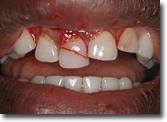

During office hours: Call us on 07 839 5831
After hours and on weekends:
If you are a patient of our practice and have an emergency after hours please call:
Dr Fiona Bailey: 021 629 521
Dr Neil Piccione: 027 348 6761
If you are not a patient of our practice:
Please call the on-call after hours dentist on: 027 492 3475
If bleeding persists, call us, or the on-call dentist or go to your nearest Accident and Emergency clinic.

If possible, gently push the tooth back into position. Hold it in while you apply pressure around the tooth with a damp cloth for several minutes.
Call us or call the emergency on call dentist as soon as possible.

Deciduous (baby) tooth
If the tooth is completely knocked out there is no treatment for that tooth other than stopping the bleeding (see above). You should contact us to set up an appointment to check no other damage has been done.
Permanent (adult) tooth
Time is critical. If you can replace the tooth immediately or keep it moist and make it to the dentist within thirty minutes, there is a reasonable chance that the tooth can be saved. The chances of successful re-implantation reduce dramatically with time, so act quickly.
Find the tooth. Do not touch the root - hold it by the crown. Do not scrub or attempt to disinfect it, as you may kill some of the living cells on the root.
If it is clean immediately after dislodgement: Try to put it back in place yourself. Hold it by the crown and push it gently back into its socket, checking that it is inserted in its original position and the right way around. Hold it in place and apply pressure around the tooth with a damp cloth for several minutes. Contact a dentist immediately.
If it is not clean: Do not touch the root - only hold it by the crown. Do not scrub or disinfect it. Rinse it with milk or weak salt solution (one level teaspoon of table salt dissolved in a large glass of cool tap water) or cold water. Alternatively, have the patient suck it clean before gently pushing it back into place. Hold it in place and apply pressure around the tooth with a damp cloth for several minutes. Contact a dentist as quickly as possible.
If you can't put the tooth back into its socket, place the tooth in a cup of milk or salt solution (one level teaspoon of table salt dissolved in a large glass of cool water) or cold water. Alternatively, put it under the patient's tongue or inside their cheek. Do not let it dry out. Do not put it in disinfectant. Contact a dentist immediately.
Note for medical colleagues: Start prophylactic antibiotics (e.g. metronidazole) immediately. If the tooth or mouth has contacted soil, consider managing for tetanus. Refer to a dentist for splinting ASAP. Phone 07 839 5831.
See your dentist as soon as possible. If it is not repaired decay can escalate beneath the filling or crown.
If your crown (cap) has come out, keep it somewhere safe and contact a dentist as quickly as possible.
If a filling or crown has come out and the sharp edges left behind are cutting your tongue or if the tooth is very sensitive, rinse the tooth with lukewarm water and fill it with well chewed sugar-free chewing-gum or some soft wax like that found on the outside of some cheeses. Contact a dentist as quickly as possible.

If you have pain from a tooth ache, contact your dentist for an appointment as soon as possible. They will advise you on steps to take in the meanwhile. You could try try applying oil of cloves (available at chemists) to the tooth that hurts. You can also use commonly available pain-killers such as paracetamol (Panadol®) or ibuprophen (Nurofen®). There are also proprietary combinations of paracetamol and ibuprophen (Maxigesic®) available over-the-counter at pharmacies.
Do not place painkillers in your mouth to dissolve - this is totally ineffective an you could cause chemical burns to your mouth by doing this.
This problem should be attended to promptly. The tooth may require root canal treatment or extraction. Antibiotics may be required.
If you have severe swelling of the face or neck or are feverish or having difficulty breathing, contact your doctor or dentist IMMEDIATELY! Do not delay.
Contact your dentist for an appointment as soon as possible. In the meantime keep your mouth and teeth as clean as possible by maintaining your regular brushing and flossing routines. You can rinse with hot salt solution (one level teaspoon of table salt in a large glass of hot water) as often as possible. A chlorhexidine mouthwash, such as Colgate Savacol® (available through us or your pharmacy), can be used twice daily after the salt rinses. Anti-inflammatory solutions like Difflam® (available from your pharmacy) may give some temporary relief.
Please resist the temptation to effect repairs at home with glue. This could make a professional repair more difficult or impossible. Contact your dentist or a clinical dental technician.
